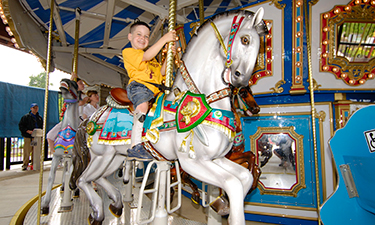 On a crisp March day, a handful of people gathered at Clemyjontri Park in McLean, Virginia. Staff from the Fairfax County Park Authority, NRPA Playground Safety Manager Caroline Smith, Certified Playground Safety Inspector John Balicki and I were all waiting for a special guest to arrive. You see, Clemyjontri Park is a playground where children of all abilities can play side by side and enjoy the benefits of getting outdoors, moving their bodies, having fun and socializing. It is an inclusive and accessible playground and a great example of the kind.
On a crisp March day, a handful of people gathered at Clemyjontri Park in McLean, Virginia. Staff from the Fairfax County Park Authority, NRPA Playground Safety Manager Caroline Smith, Certified Playground Safety Inspector John Balicki and I were all waiting for a special guest to arrive. You see, Clemyjontri Park is a playground where children of all abilities can play side by side and enjoy the benefits of getting outdoors, moving their bodies, having fun and socializing. It is an inclusive and accessible playground and a great example of the kind.
Our plan that day was to show our special guest the features of the playground, provide background information and resources about inclusive and accessible playgrounds, discuss the important role of access and inclusion, and stress how public park and recreation agencies make this happen in communities across the country. The special guest: Robert Benincasa, reporter with National Public Radio (NPR).
You may be familiar with the broadcast news stories by Benincasa that aired on NPR on August 27 and 28: “For Kids with Special Needs, More Places to Play” and “New Accessible Playground Rules May Not Go Far Enough.” But NPR also produced something else on its website as part of these special reports: a community-edited guide to accessible playgrounds.
The “Playgrounds for Everyone” searchable online database application is a compilation of accessible, inclusive playgrounds across the country. Submitted by citizens and park and recreation departments alike, the database currently has 1,826 sites identified.
When NPR conceived the idea for this database, they contacted the experts at PlayCore’s Center for Professional Development for help identifying where inclusive play spaces already existed throughout the country. PlayCore immediately provided information on hundreds of relevant sites nationwide that were created using PlayCore’s 7 Principles of Inclusive Playground Design. The Principles, created in partnership with Utah State University’s Center for Persons with Disabilities, promote a “beyond access” philosophy of design that focuses on inclusive play so all people, of all abilities, can play comfortably together.
To contribute to the database, users search for accessible or inclusive playgrounds in their area and can add sites and details or update and edit listings with more information. The data being collected on the playgrounds includes location, name, contact information and agency/owner, and the site asks for information about features the playground may have, such as smooth surfaces, transfer stations and ramps. In fact, very early on in the development of this application and a few times along the way to broadcast the stories, we asked you, our members, to contribute to the database through a survey, and many of you participated.
NPR continues to solicit submissions to the database through its website and encourages community park and recreation agencies to add their sites and locations.
Access and inclusion is one facet of the Social Equity Pillar for parks and recreation that many agencies are upholding locally. With more and more agencies adding information to this database, we can demonstrate and show how social equity is a vital component and mission of community park and recreation outlets and how this philosophy is unique to the core of what parks and recreation is all about. Not only that, with more agencies listing their sites, more people will recognize the important work and role being played in the community by local parks to ensure children and people of all abilities can enjoy their parks, recreation and playgrounds helping to improve quality of life.
So head to the NPR website and take a look at the database to make sure your inclusive, accessible playgrounds are listed and that the information is accurate. As you add new sites or features, make sure you update your listings. Let’s fill their map and database and show how community park and recreation departments are working to create open, accessible and livable communities for all people.
Lauren Hoffmann is NRPA’s Senior PR and Communications Manager.

